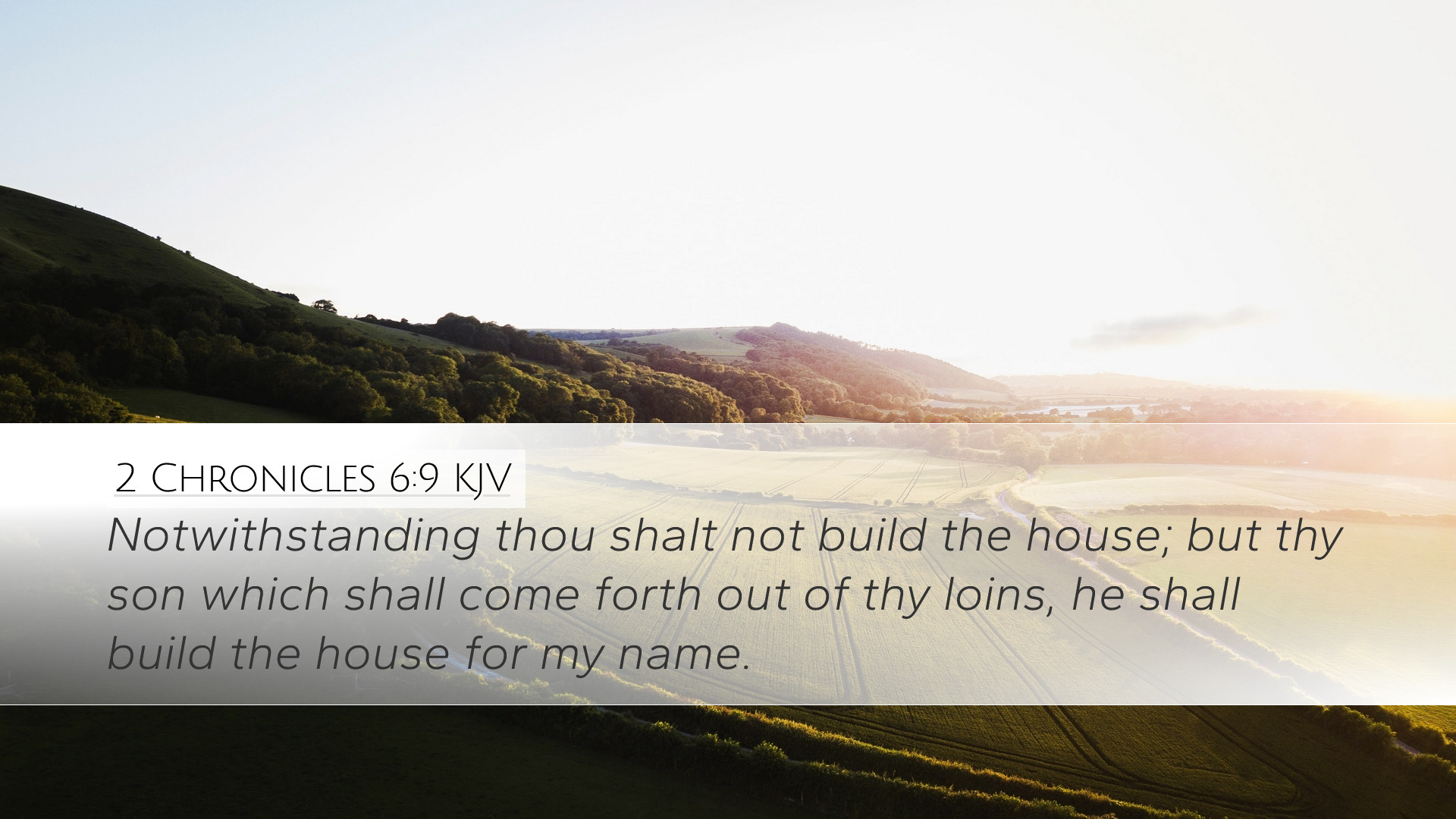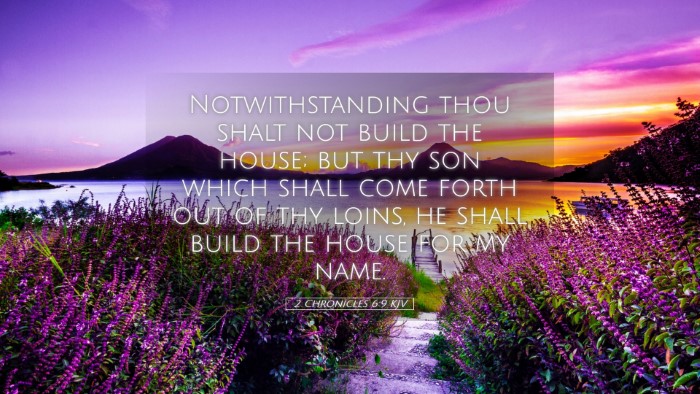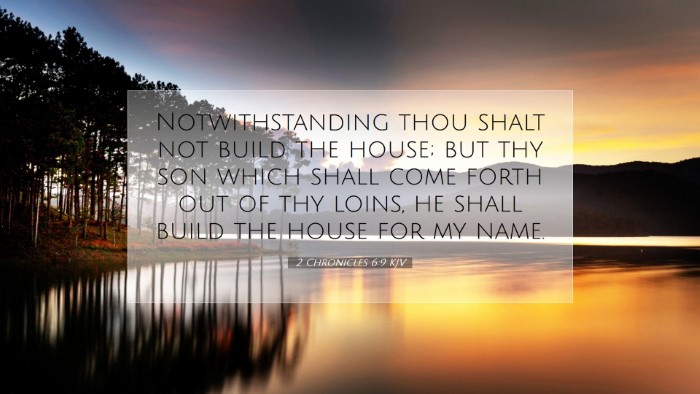Commentary on 2 Chronicles 6:9
Bible Verse: "But you shall not build the house; for your son, who shall be born to you, shall build the house for My name."
Introduction
This verse highlights a pivotal moment in the biblical narrative where God communicates His divine plan concerning the temple's construction. It emphasizes God's sovereignty and the unfolding of His promises. Here, we explore various public domain commentaries to provide a cohesive understanding of the intricacies contained within this verse.
The Context of 2 Chronicles 6
The context surrounding this verse details God's covenant with David and the promise of a son, Solomon, who would achieve what David could not: the construction of the temple. This importance of lineage and the divine plan unfolds through the historical lens provided by the chronicler.
Matthew Henry's Commentary
Matthew Henry emphasizes the significance of God's directive to David regarding the temple building. He notes that while David had the heart and desire to build the temple for God's glory, God had ordained that this monumental task would fall to Solomon. This reflects God's providential order and His ultimate authority in determining His work.
- Divine Selection: God's choice of Solomon to build the temple exemplifies a central theme of divine selection throughout Scripture, where God equips individuals according to His purpose.
- The Heart of Worship: Henry points out that the task of building the temple was not just a matter of construction but an act of worship. It served as a visible manifestation of devotion to God.
- Legacy and Continuity: The verse demonstrates how God uses generations to fulfill His promises, where a father's aspirations lead to a son's achievements.
Albert Barnes' Commentary
Albert Barnes offers an insightful examination of the conditional nature of God’s covenant with David. He highlights the distinction between David's aspirations and God's specific instructions.
- Addressing David's Desire: Barnes crystalizes David's intentions, emphasizing that although David yearned to construct a temple, God redirected this duty to Solomon. This reveals God’s majestic control over human affairs.
- Importance of Succession: This prophetic proclamation illustrates God's plans for succession within David’s lineage, underlining the importance of family and leadership in biblical narrative.
- Spiritual Significance: The temple symbolizes a deeper spiritual reality; it represents God's dwelling among His people, and by delegating its construction to Solomon, the continuity of God's presence among the Israelites is emphasized.
Adam Clarke's Commentary
Adam Clarke provides an analytical approach to the scriptures, focusing on the significance of the temple as a central element of Israel’s worship and identity.
- Divine Sovereignty: Clarke notes that God’s decision regarding the temple builder underscores His sovereignty and His intricate plans for mankind's guidance.
- Building as a Representation: The act of building the house of God represents more than physical structure; it is a reflection of God's relationship with Israel, portraying continuity in worship through successive generations.
- Future Revelations: Clarke also interprets the prophetic nature of this instruction, indicating a foreshadowing of Christ, drawing parallels between the temple built by Solomon and the spiritual temple established through Jesus Christ.
Theological Implications
As we reflect on the theological implications of 2 Chronicles 6:9, we see the interplay between divine authority and human responsibility. The predetermined choice of Solomon serves as a reminder of God's overarching plan, demonstrating His work through chosen instruments.
- God’s Sovereignty in Leadership: This verse teaches that God is intimately involved in appointing leaders and fulfilling His purposes through them.
- Faithfulness Across Generations: The promise extended beyond David to Solomon reflects God's faithfulness across generations, encouraging believers to trust in His enduring faithfulness.
- Role of Worship: The temple's construction symbolizes not merely a physical act but an ongoing relationship between God and His people, emphasizing that worship is central to both the individual and community of faith.
Practical Applications
For pastors, students, theologians, and Bible scholars, 2 Chronicles 6:9 encourages a deeper understanding of God's working in and through His people.
- Understanding Divine Directives: Recognize and embrace the divine directives and how they shape current ministry practices and leadership roles.
- Encouraging Succession Planning: As church leaders, emphasize the importance of training the next generation in faith and leadership, following the biblical pattern of succession.
- Developing a Culture of Worship: Develop and encourage a culture of worship that reflects God's presence, akin to the significance of the temple in Israel’s history.
Conclusion
2 Chronicles 6:9 encapsulates a profound theological truth about God’s sovereignty, purposeful planning, and the importance of worship. By analyzing the insights from Matthew Henry, Albert Barnes, and Adam Clarke, we glean a richer understanding of this scripture, enabling deeper reflection on the implications for ministry and personal faith.


